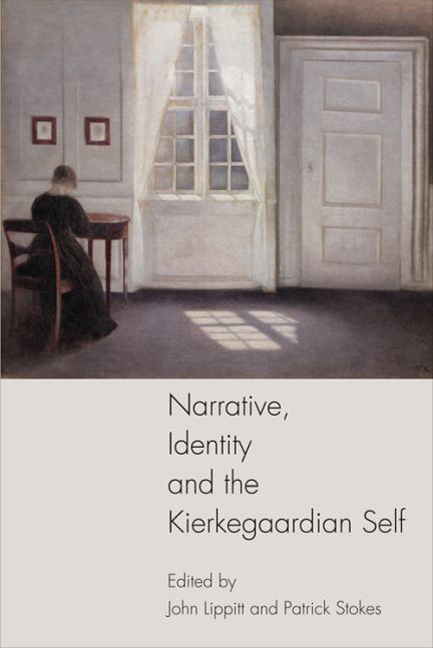Book contents
- Frontmatter
- Contents
- Acknowledgements
- Abbreviations
- Contributors
- Introduction
- 1 The Moments of a Life: On Some Similarities between Life and Literature
- 2 Teleology, Narrative and Death
- 3 Kierkegaard's Platonic Teleology
- 4 Narrative Holism and the Moment
- 5 Kierkegaard's Erotic Reduction and the Problem of Founding the Self
- 6 Narrativity and Normativity
- 7 The End in the Beginning: Eschatology in Kierkegaard's Literary Criticism
- 8 Forgiveness and the Rat Man: Kierkegaard, ‘Narrative Unity’ and ‘Wholeheartedness’ Revisited
- 9 The Virtues of Ambivalence: Wholeheartedness as Existential Telos and the Unwillable Completion of Narravives
- 10 Non-Narrative Protestant Goods: Protestant Ethics and Kierkegaardian Selfhood
- 11 Narrativity, Aspect and Selfhood
- 12 The Senses of an Ending
- 13 The End? Kierkegaard's Death and its Implications for Telling his Story
- Bibliography
- Index
12 - The Senses of an Ending
Published online by Cambridge University Press: 15 September 2017
- Frontmatter
- Contents
- Acknowledgements
- Abbreviations
- Contributors
- Introduction
- 1 The Moments of a Life: On Some Similarities between Life and Literature
- 2 Teleology, Narrative and Death
- 3 Kierkegaard's Platonic Teleology
- 4 Narrative Holism and the Moment
- 5 Kierkegaard's Erotic Reduction and the Problem of Founding the Self
- 6 Narrativity and Normativity
- 7 The End in the Beginning: Eschatology in Kierkegaard's Literary Criticism
- 8 Forgiveness and the Rat Man: Kierkegaard, ‘Narrative Unity’ and ‘Wholeheartedness’ Revisited
- 9 The Virtues of Ambivalence: Wholeheartedness as Existential Telos and the Unwillable Completion of Narravives
- 10 Non-Narrative Protestant Goods: Protestant Ethics and Kierkegaardian Selfhood
- 11 Narrativity, Aspect and Selfhood
- 12 The Senses of an Ending
- 13 The End? Kierkegaard's Death and its Implications for Telling his Story
- Bibliography
- Index
Summary
INTRODUCTION: THE SPECIAL-ENDS HYPOTHESIS
One might suppose that life's end is of special importance to narrativist views of the self, even if the specific nature of that import is opaque. Many philosophical discussions of the narrative self touch upon the end of life. End-related terms and concepts that occur in these discussions include finitude, completion, closure, telos, retroactive meaning-conferral, life shape and a closed beginning-middle-and-end structure. Those who emphasise life's end in non-philosophical narrative contexts are perhaps clearer on its significance. The end is thought to play a key role in the story of a life, securing or enhancing the life narrative's meaning or value, and thereby warranting special treatment and attention. Call this thought ‘the special-ends hypothesis’.
I wish to test the applicability of the special-ends hypothesis within philosophical narrativist accounts of the self. I will examine narrativist claims pertaining to the end of life, taking seriously the specific terms they deploy, and considering the contexts in which they occur. Superficially it seems that narrativists endorse the special-ends hypothesis, overtly or by implication. But as perspective is gained on the broader theoretical context in which the concepts are situated, this apparent support diminishes. Ultimately, for most narrativists, the end of life has no special role to play in securing or enhancing the meaning or value of life as a whole.
This is a noteworthy and somewhat surprising result for several reasons. One reason is the aforementioned prevalence of end-related concepts within narrativist discussions, which regularly draws our attention to this particular point in the life narrative. Another reason concerns the importance of endings within literature, combined with the literary heritage of the narrative self in philosophy. Ever since Alasdair MacIntyre compared the beginning-middle-and-end structure of literature to the structure of a life – in particular, drawing an analogy between the end of a story and the death of a person (1984: 212) – the ground was laid for narrativists to suppose that the end plays a particularly important role in life, as it does in literature. Comparing life to stories has incited talk of final chapters, conclusions or dénouements in life.
- Type
- Chapter
- Information
- Narrative, Identity and the Kierkegaardian Self , pp. 186 - 202Publisher: Edinburgh University PressPrint publication year: 2015

